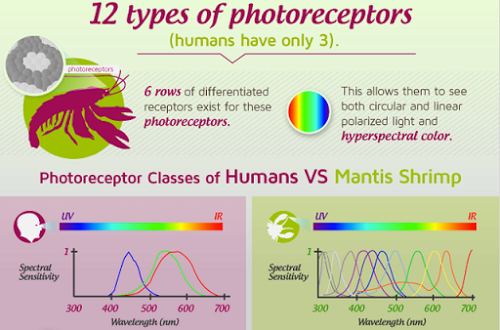Listen up folks I’m about to blow your mind with some seriously cool science about one of the ocean’s most fascinating creatures – the mantis shrimp! You’ve probably heard wild claims about these little guys seeing millions of colors but what’s the real deal? Let me break it down for you.
The Quick Answer
Contrary to popular belief, mantis shrimp can see around 8-12 basic colors While they have 12 different types of photoreceptors (compared to our measly 3), they actually aren’t as great at distinguishing between colors as we humans are Mind-blowing, right?
The Amazing Eyes of the Mantis Shrimp
Physical Structure
- Eyes mounted on mobile stalks
- Independent movement of each eye
- Trinocular vision (3 pupils per eye!)
- Can detect both visible and UV light
- 12 different types of photoreceptors
What Makes Their Eyes Special?
These little warriors have some of the most complex eyes in the animal kingdom. Each eye can:
- Move independently
- Judge depth and distance on its own
- See a special type of light called “circularly polarized light”
- Process information super quickly
The Great Color Vision Myth
For years, scientists thought that having 12 photoreceptors meant mantis shrimp could see an incredible rainbow of colors. I mean, it makes sense right? More receptors = more colors? Well, turns out nature had different plans!
The Reality Check
In 2014, some clever scientists did an experiment that changed everything Here’s what they found
- Mantis shrimp can only tell apart colors that are 25-100 nanometers different
- Humans can distinguish colors just 5 nanometers apart
- Their color vision is actually WORSE than ours!
So Why 12 Photoreceptors?
You might be wondering, “What’s the point of having all those receptors if they’re not great at seeing colors?” Well, here’s the cool part:
-
Speed Over Accuracy
- Their vision system is built for speed
- They don’t process colors like we do
- Perfect for quick hunting and survival
-
Different Processing Method
- Our brains compare signals between receptors
- Mantis shrimp process each receptor separately
- Works like a “look-up table” in their brain
-
UV Vision Benefits
- Can see ultraviolet light
- Helps spot prey and mates
- Gives them an edge in their coral reef home
The Real Superpower
The mantis shrimp’s true visual talent isn’t in seeing more colors – it’s in their lightning-fast processing speed! These little punch-throwing champions need quick eyes to match their speedy attacks (which, btw, are as fast as a .22 caliber bullet ).
What They’re Really Good At:
- Rapid color recognition
- UV light detection
- Quick movement tracking
- Independent eye movement
- Instant threat detection
Real-World Applications
Scientists are so impressed by mantis shrimp eyes that they’re using them as inspiration for:
- New camera technologies
- Medical imaging devices
- Security systems
- Military applications
The Bottom Line
While mantis shrimp don’t see the kaleidoscope of colors we once thought, their vision system is still incredibly unique and efficient. They’ve evolved exactly what they need for their lifestyle – speed, accuracy, and just enough color vision to get the job done.
Quick Facts Table:
| Feature | Humans | Mantis Shrimp |
|---|---|---|
| Photoreceptors | 3 | 12 |
| Color Discrimination | Excellent | Limited |
| Processing Speed | Slower | Very Fast |
| UV Vision | No | Yes |
| Brain Processing | Complex | Simple |
Final Thoughts
I gotta say, researching this topic has been mind-blowing! It’s crazy how nature sometimes takes the path we least expect. The mantis shrimp might not be the color-seeing champion we thought, but they’re still one of the most fascinating creatures in our oceans.
Remember, sometimes having more doesn’t mean better – it’s all about how you use what you’ve got! These little guys prove that efficiency and specialization can beat complexity any day of the week.
Would you like me to explain or break down any part of this article further?

Related links in Nature Research
Morrison, J. Mantis shrimps super colour vision debunked. Nature (2014). https://doi.org/10.1038/nature.2014.14578
- Published: 23 January 2014
- DOI: https://doi.org/10.1038/nature.2014.14578
Anyone you share the following link with will be able to read this content:
Sorry, a shareable link is not currently available for this article.
Provided by the Springer Nature SharedIt content-sharing initiative
What does the mantis shrimp see?
FAQ
What shrimp has 16 color receptors?
Mantis shrimp, on the other hand, have 16 receptor types (the most known in any animal species).
What animal can see 16 colors?
The mantis shrimp has some of the most complex eyes in the animal kingdom! How complex, you ask? While humans rely on three types of photoreceptors to perceive color, mantis shrimp have 12 to 16 types. This allows them to detect a much broader spectrum of light, and perceive polarized light in ways humans cannot!
Which animal sees the most colors?
The animal with the most color photoreceptors, and therefore likely the best color vision, is the mantis shrimp.
How many colors can butterflies see?
Butterflies can see more colors than humans, potentially seeing millions or even billions more due to having more photoreceptors in their eyes. While humans typically have three types of color receptors (red, green, and blue), butterflies can have anywhere from five to fifteen.
